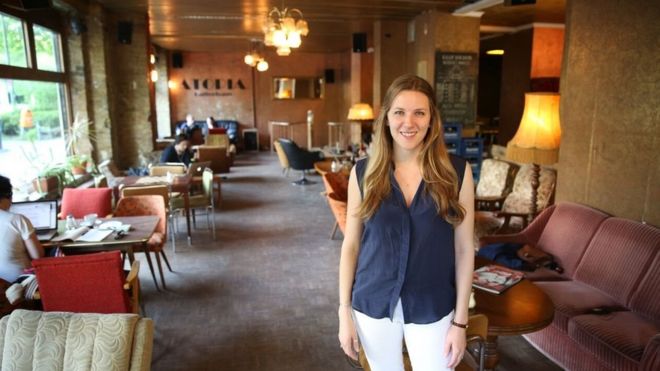Waldorf News
How US students get a university degree for free in Germany
By Franz Strasser, BBC News, Germany
While the cost of college education in the US has reached record highs, Germany has abandoned tuition fees altogether for German and international students alike. An increasing number of Americans are taking advantage and saving tens of thousands of dollars to get their degrees.

‘Mind blowing’
Katherine Burlingame decided to get her Master’s degree at a university in the East German town of Cottbus.
A graduate of Pennsylvania State University, Katherine spent less than €500 ($570) a month in Cottbus, which included housing, transportation and healthcare. On top of that she received a monthly scholarship by the DAAD (German Academic Exchange Council) of €750 ($815) which more than covered her costs.
“When I found out that just like Germans I’m studying for free, it was sort of mind blowing,” Katherine says.
“I realised how easy the admission process was and how there was no tuition fee. This was a wow moment for me.”
In the 2014-2015 academic year, private US universities charged students on average more than $31,000 for tuition and fees, with many schools charging well over $50,000. According to the Chronicle of Higher Education, Sarah Lawrence University is most expensive at $65,480.
Public universities demanded in-state residents to pay more than $9,000 and out-of-state students paid almost $23,000, according to College Board.
In Germany, tuition fees of €500-1000 were briefly instituted last decade, but Lower Saxony became the last state to phase them out again in 2014.
Students pay a fee to the university each semester to support the student union and other activities. This so called ‘semester fee’ rarely exceeds €150 and in many cases includes public transportation tickets.

Sprechen Sie Deutsch?
When Katherine came to Germany in 2012 she spoke two words of German: ‘hallo’ and ‘danke’. She arrived in an East German town which had, since the 1950s, taught the majority of its residents Russian rather than English.
“At first I was just doing hand gestures and a lot of people had compassion because they saw that I was trying and that I cared.”
She did not need German, however, in her Master’s programme, which was filled with students from 50 different countries but taught entirely in English. In fact, German universities have drastically increased all-English classes to more than 1,150 programmes across many fields.
 Roadmap to Literacy Books & Courses
Roadmap to Literacy Books & Courses Flexible preparation for your new grade
Flexible preparation for your new grade Bay Area Teacher Training
Bay Area Teacher Training Apply Today: New Cohort Starts Nov. 2025
Apply Today: New Cohort Starts Nov. 2025 Summer Programs - Culminating Class Trips
Summer Programs - Culminating Class Trips Caring for All Stages of Life
Caring for All Stages of Life Association for a Healing Education
Association for a Healing Education ~ Ensoul Your World With Color ~
~ Ensoul Your World With Color ~ Everything a Teacher Needs
Everything a Teacher Needs Space speaks. Its language is movement.
Space speaks. Its language is movement. Great books for Waldorf Teachers & Families
Great books for Waldorf Teachers & Families Waldorf Training in Australia
Waldorf Training in Australia Full-Time Teacher Education
Full-Time Teacher Education Train to Teach in Seattle
Train to Teach in Seattle Transforming Voices Worldwide
Transforming Voices Worldwide Immersive Academics and Arts
Immersive Academics and Arts
 Jamie York Books, Resources, Workshops
Jamie York Books, Resources, Workshops Bringing Love to Learning for a Lifetime
Bringing Love to Learning for a Lifetime Quality Education in the Heartland
Quality Education in the Heartland Waldorf-inspired Homeschool Curriculum
Waldorf-inspired Homeschool Curriculum The Journey is Everything
The Journey is Everything Middle School Science With Roberto Trostli
Middle School Science With Roberto Trostli

 RSS Feeds
RSS Feeds